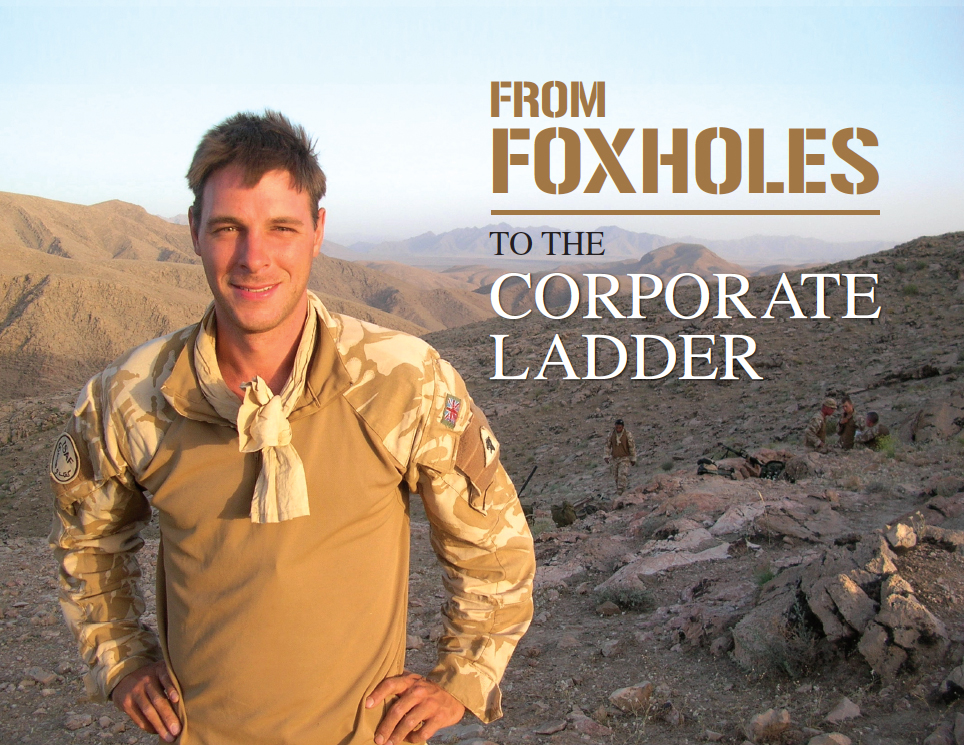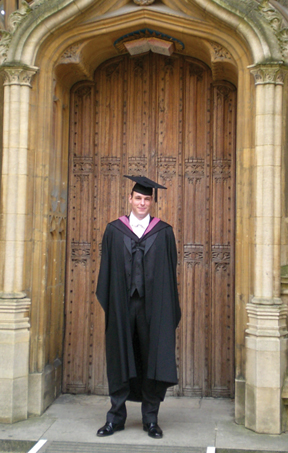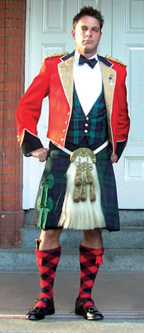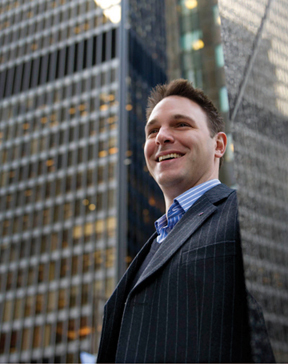From Foxholes to the Corporate Ladder

David Mack's Closet offers some tantalizing clues about the man. A tailored dinner jacket hangs beside an academic robe (“straight out of a Harry Potter film,” he says). A Black Watch regimental kilt and battle fatigues brush up against his current daily uniform—a dark business suit.
The academic robe and dinner jacket date back to his days studying Theology at Oxford University when robes were worn at formal academic gatherings and frequent undergraduate balls called for black-tie attire. The kilt was proudly worn at mess dinners and on parade with fellow members of the illustrious Black Watch (Royal Highland Regiment). The battle fatigues are in sandy shades of camouflage, the better to fade into the background of desert terrain in Afghanistan and Iraq. The business suit is a more recent acquisition, designed to fit into the corporate culture of RBC’s Bay Street headquarters where David now works as a Project Manager in IT.
Clothes may make the man, but in this case, these seemingly incongruous items say more about the life choices made by the wearer than about his sartorial style. They’re the clothes of a man who has seen much in his travels around the world, who has surmounted hardships beyond measure, and landed safely back on home turf at last.
From New Brunswick to Sandhurst
Perhaps the first of David’s unusual life choices was the decision to forego the Ontario universities within miles of his native Oshawa and study instead at St. Stephen’s University in New Brunswick. This small, Christian university on the NB/Maine border offers an intimate learning environment and an international study component that David embraced. An extensive study trip throughout Western Europe in second year solidified his love of travel while fostering an appreciation for the region’s history and culture. Three months in Africa working on humanitarian projects as part of his course work showed him he had the power, even as one person, to make a positive contribution to the world.
After graduating with a BA, David decided to explore his Christian faith more fully by studying theology. “Oxford is the centre of theological thought for the Anglican Church and has been for centuries,” he explains. “I wasn’t thinking about a church career at this point. I was more interested in my personal development and in challenging myself intellectually.” He challenged himself physically, as well, as a member of an Oxford College’s rowing and rugby teams. As one of many international students, David fit right in after experiencing a slight case of culture shock on his arrival. “I went from the City of Smoke Stacks to the famed City of Spires,” he laughs.
 Graduation day at Oxford Pushing himself, taking the more arduous path, are traits that David continued to display when he applied to take a prerequisite training course for entry into the British Army Reserves, an option open to citizens of Commonwealth countries. What started out as a desire to test himself by completing the grueling course took on a deeper meaning after the events of September 11, 2001.
Graduation day at Oxford Pushing himself, taking the more arduous path, are traits that David continued to display when he applied to take a prerequisite training course for entry into the British Army Reserves, an option open to citizens of Commonwealth countries. What started out as a desire to test himself by completing the grueling course took on a deeper meaning after the events of September 11, 2001.
“The world changed that day,” he recalls. “It was pretty clear from the outset that there would be serious repercussions.”
If there is a contradiction between holding strong Christian beliefs and taking up arms, David didn’t feel it. “In studying Christian theology—its examples of the service and sacrifice of Jesus and his disciples—it didn’t feel like a stretch for me to commit myself to service to protect humanity.”
He was accepted into the Reserves and spent the remainder of his undergrad at Oxford alternating between hitting the books and hitting the ground running in full gear on drills and operational exercises. Upon graduating in 2003, David was drawn to continue his military service full-time. After completing an intensive 12-month leadership training course at the Royal Military Academy, Sandhurst, he was commissioned as an officer. He elected to serve in the famed Black Watch regiment for the opportunity to be on the front line in the infantry, his choice of specialty. Part of its appeal was its rich history, having been founded in 1739 by King George II to “calm the troubled Highlands of Scotland.” With its strong clan traditions, it attracts not only a large contingent of enlistees from Scotland, but other Commonwealth citizens, too. During David’s tenure there were 30 Fijians, even a tribal chief or two.
From 'The Troubles' to Iraq and Afghanistan
His first command as a Rifle Platoon Commander took him deep into ‘The Troubles’ of Northern Ireland, supervising a joint military and police base that conducted aviation patrols of a region known for harbouring Republican insurgents and black marketeers. He alternated counter insurgency missions with riot control training. Even when he was off-duty and in civilian clothes, danger was ever-present. “There were places in Belfast I was forbidden to go by the Army for my own safety,” he recalls. “Even in other areas, I drove with a pistol tucked into my jeans. These places weren’t dangerous for everyone, but they were for everyone with a short haircut.”
 A secondment in 2007 to a Danish battle group took him into the thick of the Iraq War. He and his troops conducted numerous strikes against enemy insurgents in the Basra region of Southern Iraq. It was a time of heavy casualties, with the prevalence of Improvised Explosive Devices (IEDs) taking their toll. “Our mission was to conduct strike operations on enemy compounds. Using armoured vehicles, we would enter a compound and extract insurgents who would be flown out in helicopters,” he says.
A secondment in 2007 to a Danish battle group took him into the thick of the Iraq War. He and his troops conducted numerous strikes against enemy insurgents in the Basra region of Southern Iraq. It was a time of heavy casualties, with the prevalence of Improvised Explosive Devices (IEDs) taking their toll. “Our mission was to conduct strike operations on enemy compounds. Using armoured vehicles, we would enter a compound and extract insurgents who would be flown out in helicopters,” he says.
Next up was a seven-month tour in Afghanistan as part of an aviation assault battle group with responsibilities similar to those he’d had in Iraq. Based in Kandahar, he and his unit were deployed from choppers with enough gear and supplies to last 24 to 48 hours. “Each of us had to carry 10-12 litres of water plus food and equipment, and we’d often be subjected to temperatures in the 50oC range. It was a pretty challenging time,” he recalls with classic understatement.
Of even more enduring effect was the loss of two of his men in battle. Having absorbed the lesson that one of an officer’s prime responsibilities is to ensure the safety of the men and women under his command, David saw his role as that of being a shepherd to his flock. To have lost two men, to have to convey the news to their families and deliver eulogies extolling their considerable virtues—these are memories that don’t fade.
Coming home
While in Canada on leave in the summer of 2009, David decided it was time to move on to the next chapter in his life. His army career was always meant to be temporary, and with his next posting a mandatory desk job, the time seemed right to make a change. His family’s worry over his safety, the allure of home, and his keen awareness that he’d survived when others had not, also entered into the equation.
In considering his options, David recognized that his military experience would be difficult to translate for a corporate audience. His professional network was composed almost exclusively of fellow soldiers—invaluable to have at his back on the battlefield, but of little help in job hunting on Civvy Street. And so, while on leave that summer, David met with representatives of Ivey, Schulich, Rotman, and Queen’s MBA programs. He was impressed by Queen’s and with Kingston’s strong military context, but the selling point in Queen’s favour was its emphasis on the team approach.
“I knew the importance of having a team I could rely on,” he says. “There would be areas I’d need help with, but also areas where I was strong and could help my teammates.”
Back in Afghanistan after his leave, he studied for his GMAT each evening while his comrades found other ways to relieve the tensions of the day. He applied to Queen’s and was thrilled to be accepted into its acclaimed MBA program in 2010. While the heavy workload was daunting and the initial modules were “quants-heavy” in some unfamiliar subjects, David was one of the more unflappable members of his team. “I was just six months out of Afghanistan. My threshold for stress was a bit different from that of the other members of my team,” he recalls drily. “I remember saying, ‘We’ve got a lot of work ahead of us, but we’ve got air conditioning, a roof over our heads, food and water. We’re going to be ok.’”
 The staff in the School’s Business Career Centre (BCC) coached him on how to translate his Army experience into terms Corporate Canada would understand and helped him explore his career options. “There is a lot of support in Canada just now for the military, but there isn’t a corresponding understanding of the leadership and operational management skills that veterans can bring to the table,” David says.
The staff in the School’s Business Career Centre (BCC) coached him on how to translate his Army experience into terms Corporate Canada would understand and helped him explore his career options. “There is a lot of support in Canada just now for the military, but there isn’t a corresponding understanding of the leadership and operational management skills that veterans can bring to the table,” David says.
The other disadvantage was his lack of a professional network. His contacts were either theologians, academics, soldiers or veterans an ocean, or more, away. One of the lessons BCC staff conveyed was the importance of tapping into various networks, including LinkedIn, the online professional networking site. David typed in “British Army officer” and “Toronto” and was fortunate to connect with James Mayo, a corporate recruiter who lined up an interview for him with RBC. Within three weeks, David landed a job as a Project Manager in the bank’s IT department. As a member of a cross-functional team, David is responsible for tracking technology projects from start to finish. He operates within a matrix organization that is consensus-driven—a different style from the one he was accustomed to in the military, but one he appreciates for its interface with diverse parts of the bank’s operations.
His network has also expanded through his involvement with Treble Victor, an organization that helps Canadian veterans “achieve their full potential in the marketplace, through common values, teamwork, mentorship and the network’s connectivity.” David is an Executive Board Member and has been active in mentoring other returning soldiers in their transition to civilian careers. He has also become a polished spokesperson, interviewed on CBC Radio and by the National Post about his experiences. “We’re making progress in getting the word out that ex-military personnel can really make a positive contribution to both private and public sector organizations across this country.”
It may be a sedate life compared to jumping out of choppers and storming compounds, but that suits him just fine. “I survived,” he says softly. “I don’t believe in luck, I don’t believe in chance. And I’ll never know why I survived and so many other guys didn’t.”
Even a theologian with a Queen’s MBA doesn’t always have all the answers.
